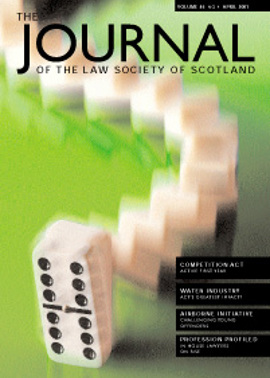Testing professional competence
An article in the October 2000 edition of The Journal set the scene for the revised Diploma in Legal Practice, the first element of the new training regime for Scottish solicitors to be introduced. The first year of the revised Diploma is now nearing its end and the course will be subject to extensive and ongoing review and improvement.
Graduates of the revised Diploma will be commencing traineeships from May onwards and will comply with the other elements of the new system – the completion of logbooks, attendance at a Professional Competence Course (PCC) and sitting the TPC towards the end of the traineeship. In June, the Glasgow Graduate School of Law will run a pilot PCC for twenty volunteer trainees which will be externally evaluated.
In addressing the construction of the Test, the Law Society is tackling the issue of competence and the issue of who makes the final decision about whether a trainee progresses to a full practising certificate.At this stage of the process, work is well advanced on the TPC. This article sets out briefly the proposed design of the TPC and looks at one or two practical concerns for potential trainees and training firms.
The TPC is being designed by a panel of four – Robert Rennie (Professor of Conveyancing at the University of Glasgow), Michael Graham (a Partner in Golds), Paul Maharg (Glasgow Graduate School of Law) and Kenneth McGowan (a partner in Dundas & Wilson C.S.). They are advised by Alison Bone of the Law Department, University of Brighton, and Professor Nick Johnson of the Oxford Institute of Legal Practice, whose combined expertise lies in the assessment of academic and skills-based legal education. I am the member of the Society’s Education and training Committee charged with liaising between the Committee and the Panel on the framework within which the Panel operates.
Objective and outcomes
The objective of the TPC is:
To ensure so far as reasonable that all qualifying solicitors are fit and proper persons to enter the profession. The TPC will identify those who should progress to a Practising Certificate.
The early work of the Panel concentrated on defining the objectives and producing a set of “outcomes”.
The standard of competence to be demonstrated is that of a newly-qualified solicitor. The “outcomes” specify, within that context, what trainees should know and be able to do as a result of successfully completing their learning.
Trainees completing the TPC will have to demonstrate the ability to integrate the following principles and skills in a framework for problem solving.- problem definition
- fact investigation
- legal issue identification and assessment
- advice and decision making
- planning and implementation
These are the areas into which such skills will be integrated:
1. Professional Conduct and Ethics – in relation to, for example, handling clients’ money and confidentiality.2. Legal Practice Skills
- Effective communication e.g. use appropriate questioning skills; gather, organise and present evidence.
- Personal Work Management e.g. meet deadlines
- Dealing with Clients e.g. prepare correspondence in clear and plain language
- Legal Research e.g. identify and analyse the detailed facts of a particular client’s position
- Drafting e.g. draft a well organised and factually correct document
- Negotiation Skills e.g. realistically assess the bargaining position of the client and party in dispute
4. Office Procedures. The trainee should have an understanding of Office Systems, Personnel and so on.
It is upon these criteria that the Society will decide whether a person is fit and proper.
Assessment format
The Panel is in the process of finalising how the test is best carried out. It has come to the view that it cannot validly be done by a simple, written exam.
The TPC is not testing legal knowledge in isolation – it is testing the integration of knowledge and skills in a workplace environment. The Test must be fair – this does not mean that it has to be by exam; to reduce, perhaps, six or seven years of experience and work to 3 hours of written exam is neither fair nor valid. Instead, the TPC comes at the end of a long period of training and is both an integral part of the training and the culmination of it.
The proposed methods of assessment, which are still subject to minor alteration, include;- a supervisor’s report
- a training record, recording not only work completed but also incorporating a continual assessment of the trainee’s progress
- an open book assessment, set by the Society, comprising a scenario drawn from an area of practice in which the trainee had experience, requiring the demonstration of learning outcomes from the above list.
Full details of the criteria against which trainees are being assessed will be drafted and made available to all trainees together with details of how the assessment is to be conducted.
Training firms will be advised of their commitment. In training, they will have to report on the trainee against clearly defined criteria and they will be expected to allow the trainee the necessary time to complete the project. The trainers may themselves require training in their new role and the Society will make such training available.
In summary the vetting of whether a person is fit and proper to enter the profession is a partnership between training firms and the Law Society but the decision is taken by the Law Society. Together, we can ensure that Scottish solicitors have the skills necessary to practise ever more successfully.






